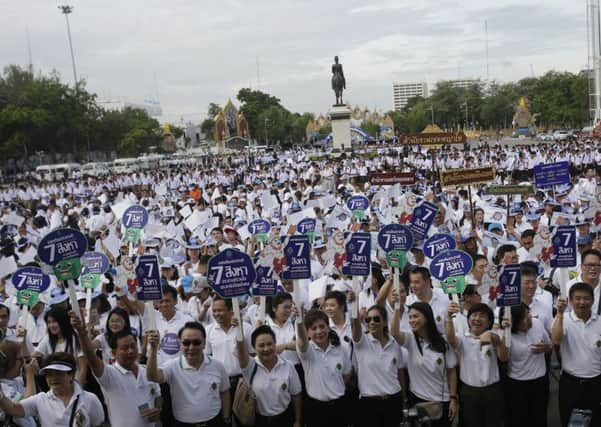Thailand vote on new constitution sparks junta warnings


“Yes” votes on a new constitution and an accompanying measure would keep the military government in control for several years and enshrine a watered-down democracy that gives much power to appointed rather than elected officials. More than 100 people who tried to campaign against the referendum on social media have been thrown in jail, and open criticism has been made punishable by up to 10 years in prison.
“The lack of open campaigning is effectively a one-sided campaign. The intention is to have campaigns for the constitution, not against the constitution, because a lot of credibility is on the line for the junta,” said Thitinan Pongsudhirak, a political analyst at Bangkok’s Chulalongkorn University. “But it also means it has boomeranged because the other side now has gathered some steam and now we are seeing more anti-charter movement rising.”
Advertisement
Hide AdAdvertisement
Hide AdThe junta, which came to power in a May 2014 coup, claims the new constitution will usher in a new era of clean politics and stable democracy in a country chronically short of both in recent years, sometimes sliding into violent internal political conflict.
Critics of the draft constitution have a long list of objections.
Chief among them: for at least a five-year “transition” period, the Senate will be a 250-member body whose members would be appointed by the junta, and include the commanders of the army and other security services. A deadlock in the 500-member elected Lower House could trigger a combined session of lower and upper chambers that could select a prime minister who is not an elected member of Parliament.
Also, emergency decrees enacted by the junta without any parliamentary consent remain valid as law. So-called independent bodies, stacked with conservative appointees, would hold “disproportionately broad and unchecked powers” that hang like a Damocles sword over elected politicians, said the international human rights consortium FIDH and the Union for Civil Liberty in Thailand.
“The draft charter creates undemocratic institutions, weakens the power of future elected governments, and is likely to fuel political instability,” they said in a report.
Even if Thais vote “no,” the military will remain in control for the foreseeable future. Junta leader Prime Minister Prayuth Chan-ocha has promised to hold elections next year, without elaborating on how that would happen if voters reject the draft constitution.
“I have no intention of holding on to power. I always said that we will have an election in 2017. ... We want the country to move forward and figure out ways to have stability for at least five years,” Prayuth said.
“If I was a real dictator, I would have not allowed the referendum or promised to hold elections.”
Advertisement
Hide AdAdvertisement
Hide AdThitinan said a “no” vote “would be a setback to the credibility of the junta, certainly, but it’s not going to see the back of them. They have insisted to remain in power. A “no” vote will mean we start over.”
Thailand has endured 13 successful military coups and 11 attempted takeovers since it replaced absolute monarchy with a constitutional monarchy in 1932.